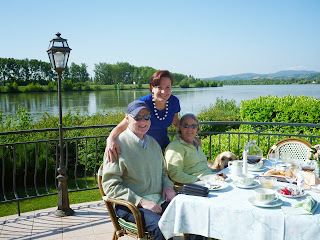 Recent press reports
note that Basilea, a troubled Swiss biotech, has finally won European
regulatory approval for their antibiotic, ceftobiprole. Why might this be important? Well, as most physicians, certainly
infectious diseases physicians know, it is much better to treat patients with
severe staph infections with a B-lactam antibiotic like a penicillin or a
cephalosporin that with almost anything else – especially vancomycin. But with the emergence and rapid spread of
the superbug MRSA starting in the early 1980s, since they were resistant to all
the B-lactams, vancomycin was all there was really. Just in the last few years,
two B-lactams, ceftaroline (from Forest) and ceftobiprole (from Basilea) were
discovered and developed for their activity against MRSA. Finally, we would have B-lactam antibiotics
to treat these superbug infections.
Ceftaroline has now been approved in the US and in Europe for the
treatment of community-acquired pneumonia and skin infections. Ceftobiprole, which actually started out
ahead of ceftaroline, was almost killed by poor quality control during their
pivotal clinical trials. This resulted
in no approvals for the drug either in the US or in Europe in spite of over 100 million dollars spent in clinical trials.
Basilea ended up suing its partner, J&J, over this and winning over
$100 million in settlements.
Recent press reports
note that Basilea, a troubled Swiss biotech, has finally won European
regulatory approval for their antibiotic, ceftobiprole. Why might this be important? Well, as most physicians, certainly
infectious diseases physicians know, it is much better to treat patients with
severe staph infections with a B-lactam antibiotic like a penicillin or a
cephalosporin that with almost anything else – especially vancomycin. But with the emergence and rapid spread of
the superbug MRSA starting in the early 1980s, since they were resistant to all
the B-lactams, vancomycin was all there was really. Just in the last few years,
two B-lactams, ceftaroline (from Forest) and ceftobiprole (from Basilea) were
discovered and developed for their activity against MRSA. Finally, we would have B-lactam antibiotics
to treat these superbug infections.
Ceftaroline has now been approved in the US and in Europe for the
treatment of community-acquired pneumonia and skin infections. Ceftobiprole, which actually started out
ahead of ceftaroline, was almost killed by poor quality control during their
pivotal clinical trials. This resulted
in no approvals for the drug either in the US or in Europe in spite of over 100 million dollars spent in clinical trials.
Basilea ended up suing its partner, J&J, over this and winning over
$100 million in settlements.
But Basilea has persisted and filed for approval for
hospital acquired pneumonia and community-acquired pneumonia with EMA. Apparently, EMA has accepted their dossier
and approved the drug for these indications (even though I can’t find this on
the EMA website). I am jumping for
joy! Why? Ceftaroline, the only other B-lactam active
against MRSA isn’t even studying hospital-acquired pneumonia. But hospital acquired pneumonia is the one
place where we most need a B-lactam for MRSA infections. Now, Europeans will
have access to the only other B-lactam around for the treatment of these infections. Plus – the drug was approved for
community-acquired pneumonia at the same time – providing some competition in
Europe for ceftaroline in this indication. What about us Americans? Sorry – but the best kind of drug to treat
MRSA pneumonia acquired in the hospital is not approved for use in these
infections by the FDA. So Londoners, Parisians, and actually virtually everyone
else in the world will have access to a B-lactam to treat MRSA infections. Since ceftobiprole is not approved for any
other indication in the US, the drug is not sold here. Ceftaroline is approved, and, in theory,
could be used for hospital acquired pneumonia off label – but the approved dose
for skin infections and community acquired pneumonia is probably too low for
hospital acquired pneumonia – a more serious infection.
Why, you might ask has ceftaroline not been studied for this
indication? Why has cetobiprole not been
approved for this indication in the US?
I would let you guess – but you already know the answer. The FDA’s requirements for approval for
hospital acquired pneumonia are still, as stated in their latest draft
guidance, completely infeasible. So there is a good chance that companies will
simply not even bother with the FDA.
Basilea says that they will apply for US approval – but unless the FDA
gets its head on straight – I’m not optimistic. Of interest, another drug,
ceftazidime-avibactam, probably the most important antibiotic for Gram negative
infections in the late stage pipeline, is carrying out trials in hospital
acquired pneumonia. But those trials are
designed with endpoints accepted by Europe, but not the US FDA. My interpretation of this is that
Astra-Zeneca, who is developing the drug, have decided that the FDA
requirements are so unrealistic that they chose the European requirements and
are going to put the US in a take it or leave it situation when it comes to
approval. It looks like Basilea has done exactly the same thing.
So, Americans, do you want the best drugs for superbug
infections or do you want to stick with something less? If you want the best – either move to Europe or move the FDA!





